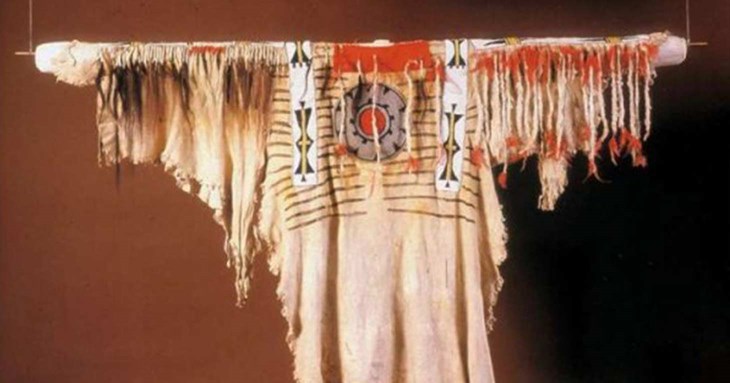Exeter City Council brings forward decision on repatriation of Crowfoot Regalia to the Siksika Nation
Published: 31 March 2020

Exeter City Council officers today posted papers on its website recommending that a group of ceremonial items that once belonged to Chief Crowfoot, a Chief of the Siksika Nation, be repatriated to the Siksika Nation in Canada.
City Councillors will meet on 7 April to make a decision about the future of the regalia which include a buckskin shirt, pair of leggings, a knife with feather bundle, two beaded bags and a horsewhip that once belonged to Chief Crowfoot, an important late nineteenth-century Blackfoot leader.
In 2015 Blackfoot Crossing Historical Park (BCHP), made a formal request for RAMM to repatriate the Crowfoot regalia. BCHP is an Interpretative visitor centre focussing on Siksika cultural heritage and the preservation of their way of life. The geographic area is of great spiritual significance to the Siksika Nation and BCHP is built on the site of the signing of Treaty 7 in September 1877. It is also the place where Crowfoot died. Today the site’s huge importance is recognised by its Designated Heritage Site status and is recommended to become a UNESCO World Heritage site.
After initial dialogue with BCHP, in January 2020 RAMM approached Chief Ouray Crowfoot, Chief at Siksika Nation. Chief Ouray Crowfoot confirmed that the Siksika Tribal Council, as the elected representatives of the community, would be prepared to take ownership of the regalia, if the transfer were agreed. He provided the necessary assurances about the long-term care of the regalia and financial information. Siksika Nation will lend Chief Crowfoot’s belongings to BCHP for display and the education of all peoples around their significance as part of world history, together with their journey to the UK and their return to the Chief’s traditional homelands.
Cllr Rachel Sutton, Exeter City Council’s Portfolio Holder for Climate and Culture said, “Following our recent approach to the Siksika Nation, and with their support, we are now able to accelerate the process associated with repatriation requests and we are pleased to deal with the formal decision sooner than planned. I am very positive that both parties are now working together to achieve the best possible outcome.”
Chief Ouray Crowfoot of the Siksika Nation said, “As a direct descendant of the Great Chief Crowfoot, I very much hope that the regalia will be returned to its rightful home, the Siksika Nation. The returning of this regalia will contribute to healing and reconciliation and the Great Chief’s spirit can rest easy once all his belonging are gathered from the four corners of Mother Earth and returned back to his home.”
About the Crowfoot Regalia
The ‘Crowfoot regalia’ are thought to have been acquired from Chief Crowfoot by Cecil Denny about the time of the signing of Treaty 7 in Alberta. Crowfoot played a key role in the treaty signing which he believed would help protect Blackfoot lands and traditional ways of life; but the terms of the treaty were broken by the Canadian administration and as a result Blackfoot people have suffered economically and socially. The regalia were loaned to RAMM by Cecil Denny’s sister in 1878 and were purchased by RAMM in 1904.
About the Blackfoot Crossing
The geography of the Blackfoot area encompasses a complex of important historic sites. The crossing refers to a point along the Bow River which was not only significant within traditional patterns of bison hunting but also was an important meeting point for the Siksika people and their allies in the Blackfoot confederacy. The crossing was the place chosen for the signing of Treaty7. BCHP opened in 2007. More information is available at the following website: https://www.pc.gc.ca/apps/dfhd/page_nhs_eng.aspx?id=7
